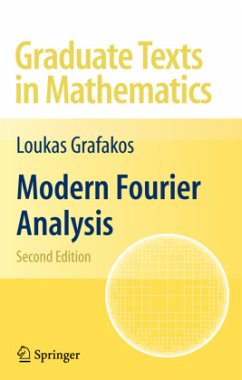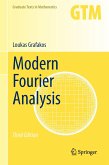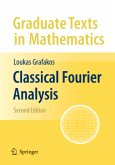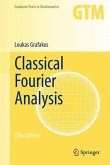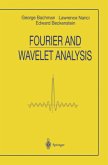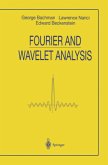The primary goal of this text is to present the theoretical foundation of the field of Fourier analysis. This book is mainly addressed to graduate students in mathematics and is designed to serve for a three-course sequence on the subject. The only prerequisite for understanding the text is satisfactory completion of a course in measure theory, Lebesgue integration, and complex variables. This book is intended to present the selected topics in some depth and stimulate further study. Although the emphasis falls on real variable methods in Euclidean spaces, a chapter is devoted to the fundamentals of analysis on the torus. This material is included for historical reasons, as the genesis of Fourier analysis can be found in trigonometric expansions of periodic functions in several variables.
While the 1st edition was published as a single volume, the new edition will contain 120 pp of new material, with an additional chapter on time-frequency analysis and other modern topics. As a result, the book is now being published in 2 separate volumes, the first volume containing the classical topics (Lp Spaces, Littlewood-Paley Theory, Smoothness, etc...), the second volume containing the modern topics (weighted inequalities, wavelets, atomic decomposition, etc...).
From a review of the first edition:
Grafakos s book is very user-friendly with numerous examples illustrating the definitions and ideas. It is more suitable for readers who want to get a feel for current research. The treatment is thoroughly modern with free use of operators and functional analysis. Moreover, unlike many authors, Grafakos has clearly spent a great deal of time preparing the exercises. - Ken Ross, MAA Online
While the 1st edition was published as a single volume, the new edition will contain 120 pp of new material, with an additional chapter on time-frequency analysis and other modern topics. As a result, the book is now being published in 2 separate volumes, the first volume containing the classical topics (Lp Spaces, Littlewood-Paley Theory, Smoothness, etc...), the second volume containing the modern topics (weighted inequalities, wavelets, atomic decomposition, etc...).
From a review of the first edition:
Grafakos s book is very user-friendly with numerous examples illustrating the definitions and ideas. It is more suitable for readers who want to get a feel for current research. The treatment is thoroughly modern with free use of operators and functional analysis. Moreover, unlike many authors, Grafakos has clearly spent a great deal of time preparing the exercises. - Ken Ross, MAA Online
From a reviews:
"Grafakos's book is very user-friendly with numerous examples illustrating the definitions and ideas. It is more suitable for readers who want to get a feel for current research. The treatment is thoroughly modern with free use of operators and functional analysis. Moreover, unlike many authors, Grafakos has clearly spent a great deal of time preparing the exercises." - Ken Ross, MAA Online
From the reviews of the second edition:
"The author ... has produced a very well-written, polished, and exciting graduate textbook which easily doubles as a reference book in a number of areas belonging to or touching on Fourier analysis. ... Modern Fourier Analysis sports a huge number off well-designed problems and exercises, and every chapter ends with an exceedingly informative set of 'Historical Notes'. ... I think it's nigh-on indispensable for the aspiring Fourier analyst." (Michael Berg, MAA Online, January, 2009)
"The second part of the two volumetreatise in harmonic analysis entitled 'Modern Fourier Analysis' is designed to be a continuation of the first volume ... . The historical notes in each chapter are intended to provide an account of past research as well as to suggest directions for further investigation. The volume is mainly addressed to graduate students who wish to study harmonic analysis." (Leonid Golinskii, Zentralblatt MATH, Vol. 1158, 2009)
"Intended for graduate students who wish to study Fourier analysis. ... also suitable for self-study. Proofs are provided in great detail. Each chapter is followed by historical notes with references, often including a discussion of further results. There are numerous exercises of varying difficulty, with hints and references provided for the harder ones. ... certainly a valuable and useful addition to the existing literature and can serve as textbooks or as reference books. Students will especially appreciate the extensive collection of exercises." (Andreas Seeger, Mathematical Reviews, Issue 2011 d)
"Grafakos's book is very user-friendly with numerous examples illustrating the definitions and ideas. It is more suitable for readers who want to get a feel for current research. The treatment is thoroughly modern with free use of operators and functional analysis. Moreover, unlike many authors, Grafakos has clearly spent a great deal of time preparing the exercises." - Ken Ross, MAA Online
From the reviews of the second edition:
"The author ... has produced a very well-written, polished, and exciting graduate textbook which easily doubles as a reference book in a number of areas belonging to or touching on Fourier analysis. ... Modern Fourier Analysis sports a huge number off well-designed problems and exercises, and every chapter ends with an exceedingly informative set of 'Historical Notes'. ... I think it's nigh-on indispensable for the aspiring Fourier analyst." (Michael Berg, MAA Online, January, 2009)
"The second part of the two volumetreatise in harmonic analysis entitled 'Modern Fourier Analysis' is designed to be a continuation of the first volume ... . The historical notes in each chapter are intended to provide an account of past research as well as to suggest directions for further investigation. The volume is mainly addressed to graduate students who wish to study harmonic analysis." (Leonid Golinskii, Zentralblatt MATH, Vol. 1158, 2009)
"Intended for graduate students who wish to study Fourier analysis. ... also suitable for self-study. Proofs are provided in great detail. Each chapter is followed by historical notes with references, often including a discussion of further results. There are numerous exercises of varying difficulty, with hints and references provided for the harder ones. ... certainly a valuable and useful addition to the existing literature and can serve as textbooks or as reference books. Students will especially appreciate the extensive collection of exercises." (Andreas Seeger, Mathematical Reviews, Issue 2011 d)
"The most up-to-date account of the most important developments in the area. ... It has to be pointed out that the hard ones usually come with a good hint, which makes the book suitable for self-study, especially for more motivated students. That being said, the book provides a good reference point for seasoned researchers as well." (Atanas G. Stefanov, Mathematical Reviews, August, 2015)

